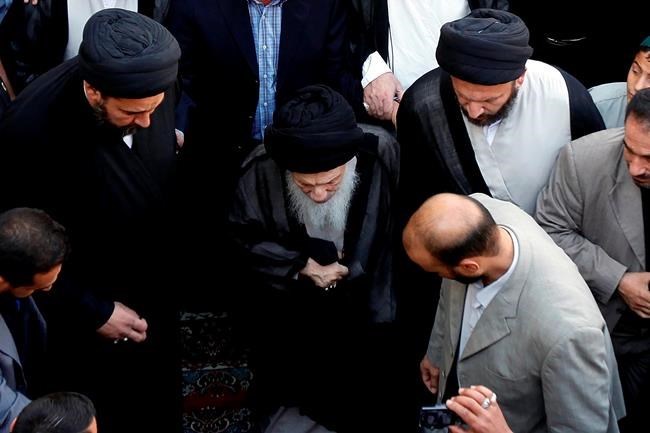
In this image dated Saturday, Aug. 29, 2009, Grand Ayatollah Sayyid Mohammed Saeed al-Hakim, center, attends a funeral procession of revered Shiite leader Abdul-Aziz Al-Hakim in Najaf, Iraq. Mohammed Saeed al-Hakim, one of Iraq's most senior and influential Muslim Shiite clerics, has died, members of his family said. He was 85. (AP Photo/Hadi Mizban)
Republished September 03, 2021 - 10:57 PM
Original Publication Date September 03, 2021 - 9:36 AM
BAGHDAD (AP) — Grand Ayatollah Sayyed Mohammed Saeed al-Hakim, one of Iraq’s most senior and influential Muslim Shiite clerics, has died of a heart attack, members of his family said. He was 85.
A relative, Mohsen al-Hakim, told The Associated Press that al-Hakim died at the Al Hayat hospital in the southern holy city of Najaf on Friday where he was taken after suffering a sudden heart attack. His office announced that he died of a sudden medical condition it did not specify.
Al-Hakim holds the highest theological title in Shiite Islam - Ayatollah al-Uzma, which means Grand or Supreme Ayatollah. He was seen as the top contender to succeed Iraq’s top Shiite cleric, Ayatollah Ali al-Sistani, who is in his early nineties.
The Najaf-born cleric is a member of the well-known and highly respected Hakim family of Shiite scholars. His maternal grandfather is Mohsen Al-Tabataba’i Al-Hakim, a scholar and one of the most prominent thinkers of Shiite Islam. His father is Muhammad Ali al-Hakim, one of the most respected clerics in Najaf.
His second cousin, Sayyed Ammar al-Hakim leads the al-Hikma, or National Wisdom Movement, one of the largest Shia political parties in Iraq.
Along with the Afghan-born Mohammed Ishaq al-Fayadh, Al-Hakim's was seen as the most likely contenders to succeed al-Sistani, Iraq's top Shiite spiritual leader.
Iraq's president and prime minister and other politicians issued statements eurlogizing Al-Hakim. The U.S. Embassy in Baghdad tweeted its condolences, describing him as “a symbol of peace, love, and harmony across the region.”
Mohammed Saeed al-Hakim was exposed from early on to an education that focused on jurisprudence and religious studies and had some of the most prominent clerics among his teachers. He soon turned to teaching and became one of the leading Shiite scholars in Najaf.
Like most Shiite religious leaders in the holy city, he was put under house arrest during the last days of Iraqi dictator Saddam Hussein’s rule, before the U.S. invasion of Iraq. He was among a group of three top Shiite leaders who were threatened with death by a rival Shiite cleric shortly after Saddam was toppled in 2003.
He was targeted in an attempted assassination in 2003, when his house in Najaf was bombed. Three of al-Hakim's bodyguards were killed, and members of his family were injured. Al-Hakim himself came away from the blast with minimal injuries. Relatives blamed terrorists for the bomb, which was hidden in a gas cylinder.
Al-Hakim is one of four Grand Ayatollahs who teach at the Hawza, the religious seminary of Najaf. He has written many books and publications, some of which were translated into several languages. Al-Hakim is survived by a wife and eight children. A funeral is expected to be held Saturday in Najaf, where he will be buried.
News from © The Associated Press, 2021